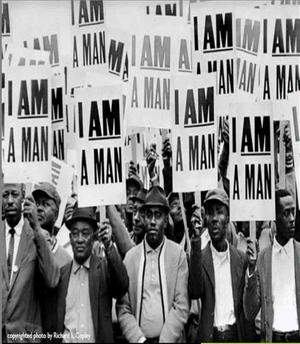It's been 50 years since President Lyndon Johnson announced his "War on Poverty." It was a time when the nation redefined its values, extending to millions of people the chance at last to be a part of the American Dream. A half century later, we have made enormous progress. But we still must do more to extend opportunity to those who live on society's margins. With patience, persistence and partnership, we can create economic opportunity for every person willing to work hard for it.
The early years of the struggle were full of both tremendous achievements (the passage of Medicare, Medicaid and the Civil Rights Act, to name just a few), but also devastating setbacks. Today in particular, I recall one of the most tragic. It was on this date -- April 4, 1968 -- that Martin Luther King Jr. was gunned down on the balcony of the Lorraine Motel in Memphis, Tenn.
The story of the events surrounding that day now serves as an inspiring lesson for me. It's a story of persecution and outright racism. It's also a story about collective bargaining and how empowered, organized workers can reduce inequality and bring about economic justice.
King had come to Memphis to lend his moral authority to the struggle of striking municipal sanitation workers who were overwhelmingly African-American. They earned poverty wages, endured degrading working conditions and faced brutal beatings when they tried to organize. "They felt a garbage man wasn't nothing," said one of the workers. "And they figured they could treat us any way they wanted to treat us." When a hydraulic ram crushed sanitation workers Echol Cole and Robert Walker to death in the back of a garbage truck, the situation came to a boiling point and more than 1,000 workers walked off the job. By the time King arrived, the strike had dragged into its third month, with workers rallying around their powerful slogan "I am a Man" and the municipal government refusing to budge.
King's assassination exacerbated existing tensions, not just in Memphis but around the country. This is where the Labor Department becomes part of the story. Days after the assassination, President Johnson dispatched James Reynolds, the assistant secretary of labor for labor-management relations, into the eye of the storm. Reynolds' clever negotiating tactics helped to clear the way for a resolution. Two weeks after King's death, the conflict was over, with the workers gaining recognition of their union and wage increases.
To fulfill the promise of economic opportunity, we must remain true to the principle that collective bargaining is a cornerstone of a free society and indispensable to a strong middle class. Everywhere we look, there are new groups of workers beginning to organize at the grassroots level. Hospital housekeepers, fast food workers, call center customer service representatives and autoworkers on the assembly line are taking action and speaking up for their rights in the workplace. Where labor rights are threatened, public sector workers like teachers and sanitation workers -- channeling the heroism of the Memphis strikers -- are refusing to back down. These diverse groups of ordinary workers are today's extraordinary champions of civil rights and labor rights -- two movements that must be one and the same.
It is King himself who articulated the spirit of collective bargaining better than anyone when he wrote, in his Letter from a Birmingham Jail, "We are caught in an inescapable network of mutuality, tied in a single garment of destiny. Whatever affects one directly, affects all indirectly." Let us remember the grievous loss we experienced on this day, but let us not forget the enduring cause that brought King to that fateful balcony and the brave men and women who carry on his legacy.

